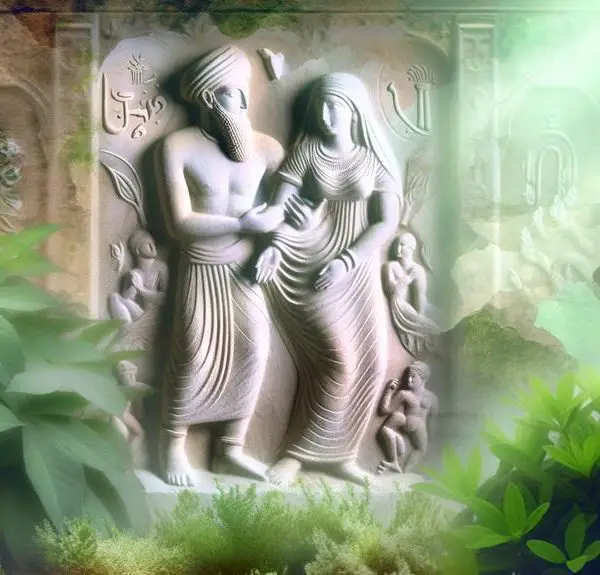Journey into the mystery of Enoch's biblical fate as we explore whether he died or was transcended directly to heaven.

Did Enoch Die in the Bible
In the Bible, you won't find a record of Enoch's death in the conventional sense. Instead, his story is marked by a mysterious translation to heaven, a direct act of God due to Enoch's exceptional piety and closeness to the divine. This rare event sets him apart from his predecessors and challenges traditional views on mortality. The narrative underscores his role as a bridge between humanity and God, enhancing his theological significance. Each perspective on Enoch's departure—from historical to mythical—offers further insights into his profound impact on religious thought and the interpretation of divine-human interactions. Exploring these facets can enrich your understanding of his legacy.
Key Takeaways
- Enoch did not experience a traditional death; he was taken directly to heaven by God.
- The Bible states that Enoch "walked with God; then he was no more."
- His departure from Earth is described as a mysterious translation rather than death.
- This unique event sets Enoch apart from other biblical figures who experienced typical mortal deaths.
- Enoch's story in the Bible emphasizes his righteousness and close relationship with God, leading to his divine ascension.
The Biblical Account of Enoch

In analyzing the biblical account of Enoch, it's evident that his narrative, unlike most, doesn't culminate in death but in a mysterious translation from earth to heaven. This unique aspect of Enoch's story raises significant questions about the nature of his departure and its theological implications.
The genealogical details provided in Genesis 5 serve as a vital framework for understanding Enoch's position within the biblical lineage. He is introduced as the son of Jared and father of Methuselah, situating him in the seventh generation from Adam. This placement is not merely chronological but carries symbolic weight, aligning with the biblical theme of completion and perfection often associated with the number seven.
Enoch's mysterious ascension, detailed briefly in Genesis 5:24, where it states that 'he walked with God; and he was not, for God took him,' sets him apart from his antediluvian ancestors and descendants. The phrase 'walked with God' indicates an exceptional level of piety and communion with the divine, which is further underscored by the ambiguous phrase 'God took him.' This phrase suggests a direct divine intervention, differing fundamentally from the natural death experienced by others in his genealogy.
Interpretations of Enoch's Fate
Various interpretations have emerged regarding Enoch's fate, each shedding light on different theological perspectives. You'll find that the ambiguity surrounding Enoch's disappearance has prompted extensive scholarly debate. Some interpretations suggest that Enoch was taken by God to serve as a mediator between the divine and humanity, a role highlighted by his prophetic activities as depicted in apocryphal texts. This view posits that his 'taking' was not a physical death but a translation to a different domain of existence, possibly serving as a precursor to the Christian concept of bodily assumption.
Others argue that Enoch's disappearance can be seen through the lens of mythical parallels found in other ancient Near Eastern cultures. Here, figures similar to Enoch often undergo transformative journeys, either physically ascending to a heavenly domain or transitioning into a different state of being. These parallels support the interpretation that Enoch's fate was an extraordinary event meant to signify his righteousness and closeness to the divine.
As you explore further, you'll notice these interpretations not only examine the nature of Enoch's departure but also reflect broader religious and cultural narratives about mortality, divine interaction, and the afterlife. Each perspective offers a unique way to understand the significance of Enoch's story in religious history.
Theological Significance

Enoch's enigmatic departure holds profound theological significance, reflecting how divine favor and human righteousness intertwine in religious narratives. This unique event isn't just a tale of ascension but a marker of the eternal implications of living a life aligned with divine principles. As you explore further, you'll find that Enoch's translation from earth to a sacred domain without experiencing death underscores a special kind of divine favor, reserved for those who walk faithfully with God.
This narrative sets a precedent in theological discourse, emphasizing that divine favor isn't arbitrary but correlates strongly with one's piety and ethical living. It suggests that such favor can transcend even the natural order, offering rewards that defy human understanding and limitations, such as death. This has significant implications for believers, instilling a hope that virtuous living can yield divine acknowledgments that are not bound by earthly existence.
Moreover, the story of Enoch invites you to ponder the nature of divine justice and mercy. It portrays a God who is intimately involved in the lives of the righteous, ready to bestow blessings that have both immediate and eternal implications. Therefore, Enoch's story isn't just historical; it's a theological blueprint on the rewards of righteousness, suggesting a profound interplay between human conduct and divine response.
Enoch in Different Traditions
Frequently, interpretations of Enoch's narrative differ greatly across religious traditions, each offering unique insights into his life and spiritual significance. In Judaism, Enoch is primarily seen as the seventh patriarch in the book of Genesis. You might find it intriguing that Enoch's lineage is meticulously detailed, emphasizing his role as a bridge between Adam and Noah. This genealogical context underscores his pivotal position in the antediluvian period, marking him as a progenitor of a line that survives the Great Flood.
In Christianity, particularly within certain mystical sects, Enoch's prophecies take on greater importance. His visions and prophetic writings, some of which are found in the non-canonical texts like the Book of Enoch, explore complex themes of divine judgment and redemption. These texts provide a richer, though apocryphal, perspective on his theological depth.
Furthermore, in Islamic tradition, although Enoch (known as Idris) is less emphasized in the Quran, he's revered as a prophet who was lifted to heaven, mirroring the Judeo-Christian narrative of his ascension. His story in Islam subtly links to themes of wisdom and piety, with Enoch portrayed as a key figure in understanding divine mysteries, thereby enriching the tapestry of Abrahamic religious narratives.
Modern Perspectives on Enoch

Scholars today continue to explore Enoch's impact on contemporary spiritual beliefs, analyzing how his ancient narrative resonates with modern values and ideologies. Enoch's symbolism, particularly his ascent to heaven without experiencing death, intrigues many. This unique departure from earthly life symbolizes ultimate purity and closeness to the divine, themes that are still potent in today's spiritual dialogues.
In scholarly debates, you'll find that interpretations of Enoch vary widely. Some view him as a mere mythological figure meant to convey moral truths, while others see him as a pivotal prophet whose experiences offer insights into the divine nature and human potential. These debates often hinge on textual analyses of ancient scriptures and apocryphal texts where Enoch appears.
Moreover, the discussion extends to Enoch's relevance in contemporary religious thought. His story is sometimes seen as a precursor to Christian and Islamic eschatological narratives, which suggests a trans-religious importance that crosses doctrinal boundaries. This aspect of Enoch's tale invites reflection on how ancient stories can provide a shared ground for interfaith dialogue today.
Thus, Enoch's enduring legacy in modern spirituality reflects a deep, ongoing quest to comprehend the divine and our place within it.
Frequently Asked Questions
How Old Was Enoch When He Vanished According to the Bible?
Inquiring about Enoch's age when he vanished, the Bible states he was 365 years old. This age reflects divine longevity and underscores the mysterious disappearance central to his narrative in religious texts.
Did Enoch Have Any Children Besides Methuselah?
Yes, besides Methuselah, Enoch had other children whose names aren't as celebrated. Analyzing Enoch's descendants reveals a significant parental legacy, reflecting on the broader genealogical impact he left in biblical narratives.
Are There Any Prayers Attributed to Enoch in Religious Texts?
In exploring Enoch's spirituality, there aren't definitive prayers directly attributed to him in canonical texts, but apocryphal influences suggest his deep spiritual engagements, often depicted in texts like the Book of Enoch.
What Specific Teachings or Prophecies Did Enoch Deliver?
Enoch's teachings and prophecies centered on righteousness and divine encounters. He emphasized living morally and conveyed messages from his celestial visits, underscoring a profound connection between ethical conduct and spiritual experiences.
Is Enoch Mentioned in Any Archaeological Findings or Historical Records?
You'll find that Enoch artifacts or historical validation of his existence are scarce. Scholarly research suggests no concrete archaeological findings directly link to Enoch, reflecting the largely textual nature of his legacy.



Sign up